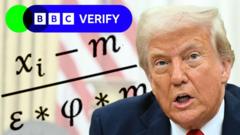The US's decision to exclude Russia from its new tariff list has surprised observers, as the country remains under significant sanctions from the West. With ongoing negotiations surrounding the Ukraine conflict and a marked change in Trump's rhetoric towards Russia, implications for international trade continue to unfold.
Trump's Tariff Exemption for Russia Sparks Controversy

Trump's Tariff Exemption for Russia Sparks Controversy
The absence of Russia from Trump's latest tariff list raises eyebrows and disappointment in Western nations.
One notable development in the latest round of tariffs announced by former President Donald Trump is the absence of Russia from the list, which has drawn criticism and suspicion from Western nations. Media reports, including one from Axios, suggested that the exclusion stems from the existing comprehensive sanctions imposed on Russia post its invasion of Ukraine in 2022. White House Press Secretary Karoline Leavitt elaborated that the current sanctions significantly hinder any substantial trade with Moscow, a point echoed by state-controlled Russian media.
In contrast, other countries with minimal trade relations with the US, notably Syria and Cuba, found their names on Trump's tariff list, raising questions about the collective rationale behind these decisions. Notably, US imports from Russia amounted to approximately $3.5 billion in 2024, mainly comprising fertilisers, nuclear fuel, and select metals. These figures underscore the complexities of global trade as relations with Russia remain tenuous.
As the geopolitical landscape evolves, Trump has been vocal about prioritizing peace negotiations, which coincides with visits from high-ranking Russian officials to Washington. His administration's willingness to maintain dialogue aims at potentially bringing about a cessation of hostilities in Ukraine—a situation underscored by Trump's threats of imposing a 50% tariff on nations buying Russian oil if President Putin does not agree to a ceasefire.
Despite the lack of tariffs, Russian propaganda outlets have framed the exemption as merely a byproduct of the harsh sanctions rather than an act of favoritism. Channels like NTV mockingly described the treatment of European allies as akin to dependency, suggesting that the current geopolitical strategy marginalizes the West.
Across the board, the new tariffs are set to affect Ukraine significantly, enforcing a 10% tariff on its exports to the US. This decision prompted an outcry from Ukrainian officials who argue that American international aid for the ongoing conflict with Russia eclipses the scale of trade relations. Ukraine's First Deputy Prime Minister, Yulia Svyrydenko, emphasized the need for advantageous trade terms to foster bilateral economic relations.
As these developments continue, the international community watches closely to see how the recalibration in trade dynamics will influence stability in the region and further negotiations surrounding the Ukrainian conflict.





















